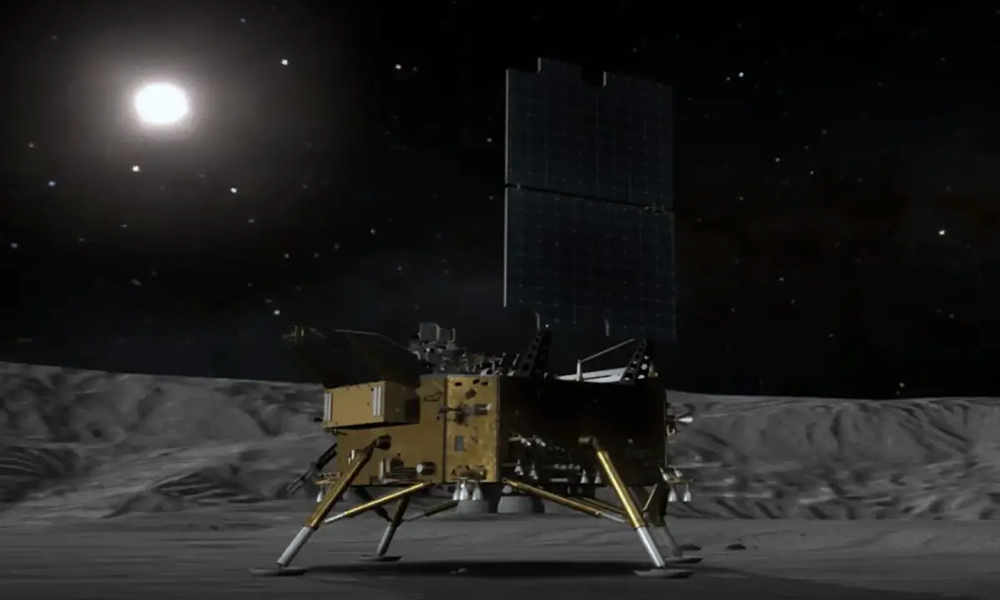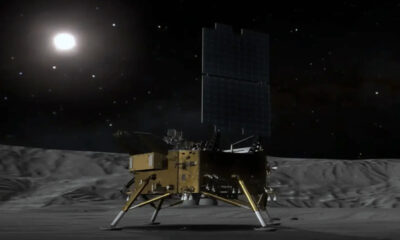Science & Technology
Samsung Elec to merge mobile and consumer electronics divisions

Samsung Electronics Co Ltd (005930.KS) said on Tuesday it will merge its mobile and consumer electronics divisions and named new co-CEOs in its biggest reshuffle since 2017 to simplify its structure and focus on growing its logic chip business, Reuters reported.
The sweeping move is the latest sign of centralised change at the world’s largest memory chip and smartphone maker, after Vice Chairman Jay Y. Lee was paroled in August from a bribery conviction.
The head of visual display business, Han Jong-hee, was promoted to vice chairman and co-CEO, and will lead the newly merged division spanning mobile and consumer electronics as well as continuing to lead the TV business.
Han has risen through the ranks in Samsung’s visual display business, without experience in mobile.
Kyung Kye-hyun, CEO of Samsung Electro-Mechanics (009150.KS), was named co-CEO of Samsung Electronics and will lead the chip and components division, read the report.
The newly merged businesses differ in size. The mobile business made 3.36 trillion won ($2.84 billion) in operating profit in the July-September quarter, compared to consumer electronics’ 760 billion won.
Other high-profile promotions included naming as vice chairman Chung Hyun-ho, the head of a “task force” which analysts said is a central coordination unit for decision-making in Samsung Electronics and affiliate companies.
“There may be more prompt execution of funds or decision-making,” said Kim Sun-woo, an analyst at Meritz Securities.
According to the report the last time Samsung Electronics named new CEOs was in late 2017.
Samsung Group is focusing on areas such as semiconductors, artificial intelligence, robotics and biopharmaceuticals, and plans to invest 240 trillion won ($206 billion) in these fields in the next three years.
Group flagship Samsung Electronics is aiming to overtake TSMC (2330.TW) to become No. 1 in chip contract manufacturing by 2030 by investing about $150 billion into logic chip businesses including foundries.
According to Reuters late last month, Samsung chose Taylor, Texas as the site of a planned $17 billion U.S. chip plant after months of deliberation, coinciding with Lee’s first business trip to the United States in five years.
Science & Technology
China, Russia may build nuclear plant on moon to power lunar station, official says
Russia’s space agency Roscosmos said last year it planned to build a nuclear reactor on the moon’s surface with the China National Space Administration (CNSA) by 2035 to power the ILRS.

China is considering building a nuclear plant on the moon to power the International Lunar Research Station (ILRS) it is planning with Russia, a presentation by a senior official showed on Wednesday.
China aims to become a major space power and land astronauts on the moon by 2030, and its planned Chang’e-8 mission for 2028 would lay the groundwork for constructing a permanent, manned lunar base.
In a presentation in Shanghai, the 2028 mission’s Chief Engineer Pei Zhaoyu showed that the lunar base’s energy supply could also depend on large-scale solar arrays, and pipelines and cables for heating and electricity built on the moon’s surface.
Russia’s space agency Roscosmos said last year it planned to build a nuclear reactor on the moon’s surface with the China National Space Administration (CNSA) by 2035 to power the ILRS.
The inclusion of the nuclear power unit in a Chinese space official’s presentation at a conference for officials from the 17 countries and international organisations that make up the ILRS suggests Beijing supports the idea, although it has never formally announced it.
“An important question for the ILRS is power supply, and in this Russia has a natural advantage, when it comes to nuclear power plants, especially sending them into space, it leads the world, it is ahead of the United States,” Wu Weiren, chief designer of China’s lunar exploration program, told Reuters on the sidelines of the conference.
After little progress on talks over a space-based reactor in the past, “I hope this time both countries can send a nuclear reactor to the moon,” Wu said.
China’s timeline to build an outpost on the moon’s south pole coincides with NASA’s more ambitious and advanced Artemis programme, which aims to put U.S. astronauts back on the lunar surface in December 2025.
Wu said last year that a “basic model” of the ILRS, with the Moon’s south pole as its core, would be built by 2035.
In the future, China will create the “555 Project,” inviting 50 countries, 500 international scientific research institutions, and 5,000 overseas researchers to join the ILRS.
Researchers from Roscosmos also presented at the conference in Shanghai, sharing details about plans to look for mineral and water resources, including possibly using lunar material as fuel.
The ILRS preceded Russia’s invasion of Ukraine in 2022 but incentives for cooperation between Roscosmos and CNSA have increased since the outbreak of the war, according to Chinese analysts.
With China’s rapid technological advances and lunar achievements, and as Western sanctions prevent Roscosmos from many imports of space technology and equipment, China can now “alleviate the pressure” on Russia and help it “achieve new breakthroughs in satellite launches, lunar exploration, and space stations,” Liu Ying, a researcher at the Chinese foreign ministry’s diplomatic academy, wrote in a journal article last year.
International Sports
IPL 2025: Robo-Dog ‘Champak’ explained
Covered in a brown fur-like print and fitted with a camera in place of a face, the robot is designed to offer dynamic, on-ground visuals from a dog’s eye view

Organizers of this year’s Indian Premier League (IPL) are blazing a trail when it comes to embracing cutting edge technology and over the past week have deployed an AI-powered robotic dog that is fast growing in popularity among both players and fans.
The mechanical camera-carrying canine, named Champak, is the latest addition to the league’s broadcast team and was introduced to the public before the Delhi Capitals and Mumbai Indians match at the Arun Jaitley Stadium on April 13.
Former New Zealand cricketer and commentator Danny Morrison formally introduced his new broadcast companion before demonstrating the IPL robot dog’s ability to run, jump, respond to various voice commands and even draw a heart shape with its front limbs.
The video clip, put out by the IPL’s social media handles, also shows Mumbai Indians’ players Hardik Pandya, Reece Topley and Delhi Capitals captain Axar Patel interacting with the robot dog and having a blast.
The IPL also called on fans to help name the robot dog, which has been a regular part of the broadcast team in subsequent matches. Fan votes eventually saw the robotic canine named Champak.
During the Lucknow Super Giants vs Chennai Super Kings clash in Lucknow, MS Dhoni couldn’t resist a little fun with the robo-dog – playfully lifting it up and putting it down sideways, much to the crowd’s delight.
Known for his love of dogs, often seen in heart-warming moments with his own pets on social media, MS Dhoni later scooped up the mechanical pup and carried it off, probably for some extra playtime.
Covered in a brown fur-like print and fitted with a camera in place of a face, the robot is designed to offer dynamic, on-ground visuals from a dog’s eye view, bringing fans closer to the action in new and immersive ways.
Comparable to a GoPro-like action cameras, the robot dog enables unique broadcast angles along the sidelines and pitch perimeter.
The IPL robot dog draws clear inspiration from the quadrupeds designed by United States-based robotics company Boston Dynamics.
Similar quadrupeds have been deployed from military logistics to hazardous site inspections. The IPL’s version appears to be a small and playful adaptation.
Have you seen Champak yet?
For cricket fans across the country, tune in today, Monday April 22, to watch Lucknow Super Giants take on Delhi Capitals. The match starts at 5pm Kabul time.
Ariana Television will broadcast the match live and exclusively across Afghanistan and hopefully Champak will once again be out of the field for fans to see.
Science & Technology
NASA rover finds fresh evidence of the warm and wet past of Mars

A mineral called siderite found abundantly in rock drilled by a NASA rover on the surface of Mars is providing fresh evidence of the planet’s warmer and wetter ancient past when it boasted substantial bodies of water and potentially harbored life.
The Curiosity rover, which landed on Mars in 2012 to explore whether Earth’s planetary neighbor was ever able to support microbial life, found the mineral in rock samples drilled at three locations in 2022 and 2023 inside Gale crater, a large impact basin with a mountain in the middle, Reuters reported.
Siderite is an iron carbonate mineral. Its presence in sedimentary rocks formed billions of years ago offers evidence that Mars once had a dense atmosphere rich in carbon dioxide, a gas that would have warmed the planet through the greenhouse effect to the point that it could sustain bodies of liquid water on its surface.
There are features on the Martian landscape that many scientists have interpreted as signs that liquid water once flowed across its surface, with potential oceans, lakes and rivers considered as possible habitats for past microbial life.
Carbon dioxide is the main climate-regulating greenhouse gas on Earth, as it is on Mars and Venus. Its presence in the atmosphere traps heat from the sun, warming the climate.
Until now, evidence indicating the Martian atmosphere previously was rich in carbon dioxide has been sparse. The hypothesis is that when the atmosphere – for reasons not fully understood – evolved from thick and rich in carbon dioxide to thin and starved of this gas, the carbon through geochemical processes became entombed in rocks in the planet’s crust as a carbonate mineral.
The samples obtained by Curiosity, which drills 1.2 to 1.6 inches (3-4 centimeters) down into rock to study its chemical and mineral composition, lend weight to this notion. The samples contained up to 10.5% siderite by weight, as determined by an instrument onboard the car-sized, six-wheeled rover.
“One of the longstanding mysteries in the study of Martian planetary evolution and habitability is: if large amounts of carbon dioxide were required to warm the planet and stabilize liquid water, why are there so few detections of carbonate minerals on the Martian surface?” said University of Calgary geochemist Benjamin Tutolo, a participating scientist on NASA’s Mars Science Laboratory Curiosity rover team and lead author of the study published on Thursday in the journal Science, opens new tab.
“Models predict that carbonate minerals should be widespread. But, to date, rover-based investigations and satellite-based orbital surveys of the Martian surface had found little evidence of their presence,” Tutolo added.
Because rock similar to that sampled by the rover has been identified globally on Mars, the researchers suspect it too contains an abundance of carbonate minerals and may hold a substantial portion of the carbon dioxide that once warmed Mars.
The Gale crater sedimentary rocks – sandstones and mudstones – are thought to have been deposited around 3.5 billion years ago, when this was the site of a lake and before the Martian climate underwent a dramatic change.
“The shift of Mars’ surface from more habitable in the past, to apparently sterile today, is the largest-known environmental catastrophe,” said planetary scientist and study co-author Edwin Kite of the University of Chicago and Astera Institute.
“We do not know the cause of this change, but Mars has a very thin carbon dioxide atmosphere today, and there is evidence that the atmosphere was thicker in the past. This puts a premium on understanding where the carbon went, so discovering a major unsuspected deposit of carbon-rich materials is an important new clue,” Kite added.
The rover’s findings offer insight into the carbon cycle on ancient Mars.
On Earth, volcanoes spew carbon dioxide into the atmosphere, and the gas is absorbed by surface waters – mainly the ocean – and combines with elements such as calcium to form limestone rock. Through the geological process called plate tectonics, this rock is reheated and the carbon is ultimately released again into the atmosphere through volcanism. Mars, however, lacks plate tectonics.
“The important feature of the ancient Martian carbon cycle that we outline in this study is that it was imbalanced. In other words, substantially more carbon dioxide seems to have been sequestered into the rocks than was subsequently released back into the atmosphere,” Tutolo said.
“Models of Martian climate evolution can now incorporate our new analyses, and in turn, help to refine the role of this imbalanced carbon cycle in maintaining, and ultimately losing, habitability over Mars’ planetary history,” Tutolo added.
-

 Sport5 days ago
Sport5 days agoAfghanistan qualify for U19 Cricket World Cup 2026
-

 World4 days ago
World4 days agoThousands of protesters rally against Trump across US
-

 World5 days ago
World5 days agoIran, US end nuclear talks in Rome, agree to meet next week
-

 Latest News4 days ago
Latest News4 days agoPolio vaccination campaign launched in Afghanistan
-

 International Sports4 days ago
International Sports4 days agoIPL 2025: 14-year-old Vaibhav Suryavanshi becomes youngest IPL player
-

 International Sports2 days ago
International Sports2 days agoIPL 2025: Robo-Dog ‘Champak’ explained
-

 Latest News3 days ago
Latest News3 days agoChina invites various Afghan delegations to attend Shanghai forums
-

 Latest News3 days ago
Latest News3 days agoAriana Afghan Airlines increases flights to China
























